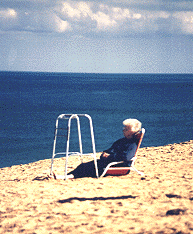Your Internet Guide to the resources devoted to serving older adults on
Cape Cod and the Islands.

The Facts About Occupational Therapy
The following article was reposted from the American Occupational Therapy Association
Occupational therapy is skilled treatment that helps individuals achieve independence in all facets of their lives. Occupational Therapy gives people the "Skills for the Job of Living" they need to live satisfying lives. Services typically include:
 Occupational therapy practitioners are skilled professionals whose education includes the study of
human growth and development with specific emphasis on the social, emotional, and physiological
effects of illness and injury. The occupational therapist enters the field with a bachelor's, master's,
or doctoral degree. The occupational therapy assistant generally earns an associate's degree. Practitioners
must complete supervised clinical internships in a variety of health care settings, and pass a national
examination. Most states also regulate occupational therapy practice.
Occupational therapy practitioners are skilled professionals whose education includes the study of
human growth and development with specific emphasis on the social, emotional, and physiological
effects of illness and injury. The occupational therapist enters the field with a bachelor's, master's,
or doctoral degree. The occupational therapy assistant generally earns an associate's degree. Practitioners
must complete supervised clinical internships in a variety of health care settings, and pass a national
examination. Most states also regulate occupational therapy practice.
Who Benefits from Occupational Therapy?
A wide variety of people can benefit from occupational therapy, including those with
How OT Works
Every day, countless people of all ages experience problems that significantly affect their ability to manage their daily lives. With the help of occupational therapy, many of these individuals can achieve or regain a high level of independence. From the infant with a birth defect or injury to the person affected by aging, occupational therapy helps people make the most of their abilities When skill and strength cannot be developed or improved, occupational therapy offers creative solutions and resources for carrying out the person's daily activities.
Alzheimer's Disease
Art Anderson's family was not surprised when the doctor confirmed that his growing memory problems were caused by Alzheimer's disease. Their main concern was the effect his care was having on his wife, who was dealing with health problems of her own. They found help in a day care program for people with Alzheimer's disease. Here Art enjoys social interactions, meals, and leisure activities designed for people with his condition. Art's wife Martha attends weekly group meetings led by an occupational therapist. Here she learns to help her husband to participate as much as possible in the family's routine and how to manage the many tasks that make up her "job of living."
Stroke
Helen Richards is a publishing executive, respected for her business skills and admired for her perfect grooming. Three months ago Helen had a stroke. During her recovery she had to relearn many things, but her first goal was to face the world with her hair and makeup in place. Helen's occupational therapist understood. Together they found the right combination of tools and techniques so Helen could handle her personal grooming. They also worked on the other tasks she would need to manage in her home and upon return to work. From makeup to management, occupational therapy helped Helen recover the skills she needed.
Developmental Problems
Tommy weighed just three pounds at birth. Doctors warned his parents to be on the look out for problems that might affect his development. In the hospital nursery and occupational therapist helped Tommy with the very basic skill of taking in enough nourishment. As a toddler, Tommy attended a Head Start program where occupational therapists and occupational therapy assistants provided activities to aid in his physical and mental development. For youngsters like Tommy, the "job of living" calls upon basic skills such as eating, playing, and interacting successfully with family members and friends.
 
Other Articles in Inter-Generations
Contact Inter-Generations at intergens@cox.net
 

|
©1996-2025 Inter-Generations
|
|